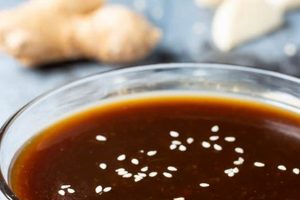The query regarding the suitability of pomodoro sauce for vegan diets centers on its ingredients. Traditional recipes primarily feature tomatoes, basil, and olive oil. However, variations exist, and the inclusion of animal-derived products must be assessed.
Understanding the composition of this sauce is crucial for individuals adhering to plant-based dietary restrictions. Examining both commercially produced and homemade versions becomes essential. Awareness of potential non-vegan additives ensures informed consumption.
The following sections will elaborate on common ingredients, potential pitfalls, and methods for ensuring that the preparation aligns with vegan principles.
Ensuring Pomodoro Sauce Aligns with Vegan Principles
The following tips provide guidance on verifying the vegan status of pomodoro sauce, whether purchased or prepared at home.
Tip 1: Scrutinize Ingredient Lists. Carefully examine the ingredient list of any commercially produced pomodoro sauce. Look for hidden animal products, such as dairy derivatives like whey or casein, or animal-based flavor enhancers.
Tip 2: Inquire About Restaurant Preparations. When ordering pasta with pomodoro sauce in a restaurant, proactively ask about the ingredients. Clarify whether any non-vegan components, like butter or cheese, are used in the sauce’s preparation.
Tip 3: Opt for Homemade Versions. Preparing pomodoro sauce from scratch offers complete control over ingredients. This allows for the exclusion of any questionable components and the assurance of a vegan-friendly product.
Tip 4: Replace Butter with Olive Oil. Traditional recipes may include butter for richness. Substitute with high-quality olive oil to maintain flavor while adhering to vegan guidelines.
Tip 5: Avoid Added Sugar Without Verification. Some processed sugars are filtered using bone char. While it’s not an ingredient, the process renders the sugar non-vegan. Opt for certified vegan sugar or alternative sweeteners like agave nectar.
Tip 6: Be Wary of “Natural Flavors.” The term “natural flavors” can sometimes conceal animal-derived ingredients. Contact the manufacturer for clarification if uncertainties arise.
Tip 7: Select Certified Vegan Products. Look for products bearing a certified vegan label. This provides an added layer of assurance regarding the product’s adherence to vegan standards.
Adherence to these guidelines ensures informed decisions regarding pomodoro sauce consumption, aligning dietary choices with vegan ethics.
The subsequent section summarizes the critical points regarding the vegan compatibility of this widely enjoyed sauce.
1. Ingredient list scrutiny
Ingredient list scrutiny is fundamentally linked to determining whether pomodoro sauce aligns with vegan dietary restrictions. The primary cause for pomodoro sauce being non-vegan stems from the inclusion of animal-derived additives, often obscured within lengthy product labels. Therefore, meticulous examination of the ingredient list becomes a crucial step in ascertaining its vegan status. Examples of non-vegan ingredients that may appear include whey, casein, or animal-based flavorings. The absence of such elements, verified through careful scrutiny, provides assurance for vegan consumers.
The importance of ingredient list examination extends beyond simply identifying obvious non-vegan components. Certain ingredients, such as refined sugar processed using bone char, are considered non-vegan by some adherents, despite not directly containing animal products. Similarly, vague terms like “natural flavors” may conceal animal-derived substances. This necessitates a deeper level of scrutiny, sometimes requiring contact with the manufacturer for clarification. Without this attention to detail, consumers risk unintentionally violating their dietary principles.
In conclusion, ingredient list scrutiny is not merely a perfunctory task but an essential practice for individuals adhering to a vegan lifestyle seeking to enjoy pomodoro sauce. It empowers consumers to make informed choices, preventing the unintentional consumption of animal-derived products. This proactive approach highlights the central role of informed awareness in navigating the complexities of food labeling and dietary adherence.
2. Hidden animal products
The presence of hidden animal products presents a significant challenge in determining if pomodoro sauce is vegan. While the base ingredients tomatoes, basil, and olive oil are inherently plant-based, manufacturers often incorporate additives that compromise its vegan status. This inclusion is frequently undetectable without careful examination of the ingredient list, rendering informed consumption difficult.
A primary example is the use of refined sugar processed using bone char, a filter made from animal bones. Although the sugar itself does not contain bone char, the processing method renders it non-vegan according to strict interpretations. Similarly, the term “natural flavors” can mask animal-derived flavor enhancers. Dairy products, such as whey or casein, are also sometimes added for texture or flavor enhancement. In restaurant preparations, butter may be used to enrich the sauce, deviating from purely plant-based ingredients. Therefore, the seemingly simple pomodoro sauce presents a minefield of potential non-vegan components.
Understanding the pervasive nature of these hidden animal products is crucial for vegan consumers. It necessitates a proactive approach, involving meticulous ingredient list examination, direct inquiries to manufacturers or restaurants, and a preference for homemade versions where complete control over ingredients is maintained. Failure to acknowledge and address this challenge risks the unintentional consumption of animal products, undermining adherence to vegan principles. This proactive awareness is essential for informed dietary choices.
3. Vegan certification labels
Vegan certification labels play a pivotal role in assisting consumers in determining if pomodoro sauce adheres to vegan standards. These labels provide assurance that a third-party organization has verified the product’s ingredients and manufacturing processes, confirming the absence of animal-derived components. The reliability of these labels varies depending on the certifying body’s standards and enforcement procedures.
- Ingredient Verification
Certification bodies rigorously examine the ingredient list to ensure no animal products, by-products, or derivatives are present. This includes scrutinizing common hidden ingredients such as dairy (whey, casein), honey, and certain sugars processed with bone char. The verification process may involve contacting suppliers to confirm the source and processing methods of specific ingredients. For pomodoro sauce, this ensures that seemingly innocuous components like sugar or “natural flavorings” are indeed vegan-compliant.
- Manufacturing Process Assessment
Beyond ingredient verification, certification bodies assess the manufacturing process to prevent cross-contamination with animal products. This involves inspecting facilities, equipment, and cleaning procedures. In the context of pomodoro sauce, it ensures that the production line has measures to prevent contact with non-vegan ingredients used in other products manufactured in the same facility. It also confirms that equipment is thoroughly cleaned after processing non-vegan items.
- Label Transparency and Traceability
Reputable vegan certification labels maintain transparency regarding their standards and certification process. Consumers can typically access information about the criteria a product must meet to achieve certification. This traceability allows consumers to verify the label’s credibility and understand the level of assurance it provides. It also enables them to hold certifying bodies accountable for maintaining rigorous standards. In this case, a vegan pomodoro sauce with a transparent label would provide clear reasons for its certification.
- Global Variations and Recognition
Several vegan certification labels exist globally, each with its own standards and recognition. Some labels are widely recognized and trusted, while others may have limited geographic reach or less stringent requirements. Consumers must be aware of these variations when selecting certified vegan pomodoro sauce. Labels from established organizations are generally considered more reliable. It’s also essential to understand if the certification is recognized and accepted in the consumer’s region.
The presence of a credible vegan certification label significantly simplifies the process of determining the suitability of pomodoro sauce for vegan diets. However, consumers should still familiarize themselves with the specific standards of the certifying body to ensure they align with their personal ethical and dietary preferences. Reliance on certification labels offers a valuable safeguard against hidden animal products, promoting informed and confident consumption.
4. Homemade control preferred
The preference for homemade pomodoro sauce arises directly from the inherent ambiguity surrounding commercially produced versions and their potential inclusion of non-vegan ingredients. Manufacturing processes, often prioritizing cost-effectiveness and shelf-life extension, may introduce animal-derived additives undetectable without meticulous label examination. The ability to regulate each component in a homemade preparation ensures adherence to vegan dietary principles, mitigating the risk of unintentional consumption of non-compliant ingredients. This control extends from selecting specific tomato varieties to verifying the source of sugar, spices, and even the type of oil used.
Practical examples illustrate the significance of this control. Consider the potential presence of refined sugar processed using bone char. While this processing method does not leave detectable animal products in the sugar itself, it renders the final product non-vegan according to many strict interpretations. Similarly, natural flavors listed on ingredient labels can conceal animal-derived flavor enhancers. In a homemade setting, a vegan practitioner can opt for unrefined sugar or alternative sweeteners like agave nectar, circumventing the bone char issue entirely. Olive oil can be confidently used instead of butter to enrich the sauce texture in a homemade version, eliminating the risk of dairy being added. Therefore, the homemade approach grants a direct path to verifying the vegan integrity of the final product.
The preference for homemade pomodoro sauce is not merely a culinary choice; it is a proactive step toward ensuring dietary compliance and upholding ethical standards. While commercially produced options exist, the ambiguity surrounding ingredients and manufacturing processes necessitates a level of diligence that may prove burdensome. Preparing pomodoro sauce at home provides a transparent and verifiable process, minimizing the risk of unintended non-vegan consumption. This level of control offers peace of mind and aligns dietary practices with personal convictions, underscoring its importance for vegan individuals.
5. Butter/Sugar Alternatives
The consideration of butter and sugar alternatives directly impacts the assessment of whether pomodoro sauce aligns with vegan dietary guidelines. Traditional recipes and commercial variations may include these ingredients, necessitating mindful substitution to ensure compatibility. The presence of butter introduces dairy, an obvious exclusion for vegans, while the source and processing of sugar warrant similar scrutiny. Therefore, selecting appropriate replacements becomes critical in achieving a truly plant-based sauce.
Olive oil serves as a widely accepted alternative to butter, providing a similar richness and mouthfeel to the sauce. Furthermore, various plant-based oils can also be used in replacement for butter, with considerations for taste profiles, and cooking properties of said oil. Sugar, often added to balance acidity, can be replaced with alternatives such as agave nectar, maple syrup, or even dates. Each option provides varying degrees of sweetness and possesses distinct flavor characteristics, requiring careful adjustment to maintain the intended taste profile. For example, agave nectar offers a neutral sweetness, while maple syrup introduces a subtle, distinctive flavor. The bone-char refining process of some sugars also necessitates a switch to certified vegan sugar or these other natural sweeteners.
In conclusion, the conscious substitution of butter and potentially non-vegan sugar is fundamental to ensuring the vegan status of pomodoro sauce. Acknowledging the role of these ingredients and selecting suitable alternatives allows individuals to enjoy a plant-based version of this popular sauce without compromising their dietary principles. These substitutions are not mere modifications, but rather essential components in creating a truly vegan-compliant recipe.
Frequently Asked Questions Regarding Pomodoro Sauce and Veganism
The following addresses prevalent inquiries concerning the compatibility of pomodoro sauce with vegan dietary principles.
Question 1: What are the primary non-vegan ingredients to watch out for in commercially prepared pomodoro sauce?
Potential non-vegan ingredients include dairy derivatives such as whey or casein, animal-based flavor enhancers often concealed under the term “natural flavors,” and refined sugar processed using bone char.
Question 2: How can a consumer determine if the sugar used in pomodoro sauce is vegan?
The consumer should seek certified vegan sugar or inquire with the manufacturer regarding the sugar refinement process. If bone char is used, the sugar is generally considered non-vegan by strict adherents.
Question 3: Is butter always present in traditional pomodoro sauce recipes?
While some variations incorporate butter for added richness, it is not a universal ingredient. Many traditional recipes rely solely on olive oil.
Question 4: How reliable are vegan certification labels in guaranteeing the vegan status of pomodoro sauce?
The reliability depends on the certifying organization’s standards and enforcement. Labels from reputable organizations generally offer a reasonable assurance, but consumers are advised to familiarize themselves with the specific criteria employed.
Question 5: What is the best approach when ordering pasta with pomodoro sauce in a restaurant?
Proactively inquire about the sauce’s ingredients. Specifically, request confirmation that no butter, cheese, or other animal-derived products are used in its preparation.
Question 6: Why is homemade pomodoro sauce often recommended for vegans?
Homemade preparation offers complete control over ingredients, eliminating the risk of encountering hidden animal products commonly found in commercially produced versions. The decision regarding each ingredient becomes the consumer’s responsibility.
In summary, verifying the vegan status of pomodoro sauce demands careful attention to ingredients, processing methods, and preparation techniques.
The succeeding section provides a comparative analysis of various pomodoro sauce brands and their suitability for vegan diets.
Concluding Remarks on Pomodoro Sauce and Veganism
The foregoing analysis has demonstrated that the question of whether pomodoro sauce is vegan necessitates careful consideration. While the fundamental ingredients may align with plant-based dietary restrictions, commercially produced variations often contain additives that compromise its vegan status. Scrutiny of ingredient lists, awareness of hidden animal products, and recognition of reputable vegan certification labels remain crucial for informed consumption. Preference for homemade preparations provides the most reliable means of ensuring compliance with vegan principles.
Therefore, responsible consumption of pomodoro sauce within a vegan framework demands vigilance and proactive investigation. The inherent ambiguity surrounding commercially available products necessitates a commitment to informed decision-making. Further research and continued awareness within the food industry are essential for simplifying the process of identifying truly vegan-compliant options. By understanding the potential pitfalls and embracing informed choices, individuals can confidently integrate pomodoro sauce into their plant-based diets.







